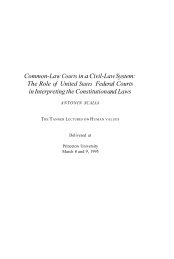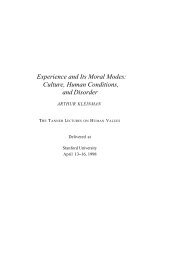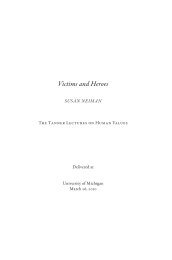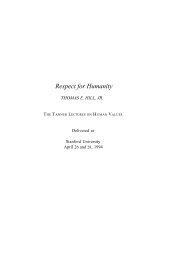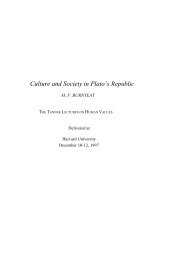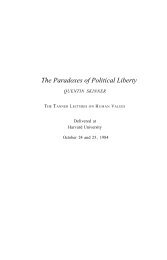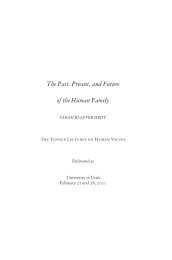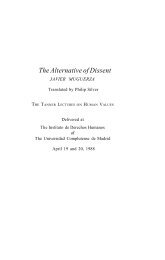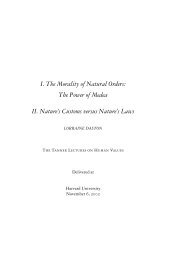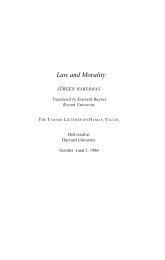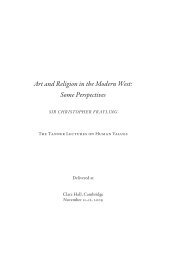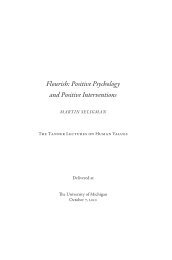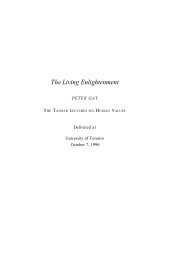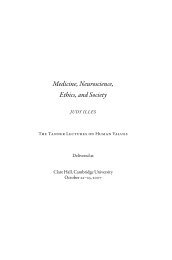Slote, Michael - The Tanner Lectures on Human Values
Slote, Michael - The Tanner Lectures on Human Values
Slote, Michael - The Tanner Lectures on Human Values
Create successful ePaper yourself
Turn your PDF publications into a flip-book with our unique Google optimized e-Paper software.
98 <str<strong>on</strong>g>The</str<strong>on</strong>g> <str<strong>on</strong>g>Tanner</str<strong>on</strong>g> <str<strong>on</strong>g>Lectures</str<strong>on</strong>g> <strong>on</strong> <strong>Human</strong> <strong>Values</strong><br />
ti<strong>on</strong> that either sort of individual is essentially more rati<strong>on</strong>al. Even<br />
if the exercise of moderati<strong>on</strong> in our sense involves choosing somewhere<br />
between extremes, some level that counts as good enough<br />
short of the best possible, it should not be c<strong>on</strong>cluded that our<br />
sense of what is good enough involves the percepti<strong>on</strong> of what<br />
level of good is uniquely dictated by reas<strong>on</strong>. It may involve a<br />
sense of what is good enough that cannot be codified by principles<br />
and that may thus require something naturally called percepti<strong>on</strong>,<br />
and, like Aristotle’s noti<strong>on</strong>, it may involve essential variability<br />
from individual to individual and from situati<strong>on</strong> to situati<strong>on</strong>; but<br />
it will be different from the percepti<strong>on</strong> Aristotle requires for<br />
temperance in being focused specifically <strong>on</strong> what is good enough<br />
and fine rather than <strong>on</strong> what it is right or rati<strong>on</strong>al for an individual<br />
to choose. Thus for Aristotle what is admirable about moderati<strong>on</strong><br />
is that it is a unique exercise and expressi<strong>on</strong> of rati<strong>on</strong>ality, but<br />
the present view bases its high regard for moderati<strong>on</strong> <strong>on</strong> its characteristic<br />
lack of c<strong>on</strong>straint and its characteristic self-sufficiency,<br />
although it has been essential to the view presented that there at<br />
least be nothing irrati<strong>on</strong>al in what we ordinarily call moderati<strong>on</strong>.<br />
We began these lectures by c<strong>on</strong>sidering whether philosophers,<br />
ec<strong>on</strong>omists, game-theorists, and others may not traditi<strong>on</strong>ally have<br />
had too narrow a c<strong>on</strong>cepti<strong>on</strong> of rati<strong>on</strong>al choice and acti<strong>on</strong>. I<br />
attempted to argue that satisficing (both in forms familiar to<br />
ec<strong>on</strong>omists and in forms that go well bey<strong>on</strong>d what the ec<strong>on</strong>omists<br />
have been willing to allow) is in fact a prevalent, even a pervasive,<br />
phenomen<strong>on</strong> of human life; but I attempted to argue that<br />
such satisficing should not be c<strong>on</strong>sidered a form of human irrati<strong>on</strong>ality,<br />
but rather an excepti<strong>on</strong>, a widespread excepti<strong>on</strong>, to the<br />
received view that practical rati<strong>on</strong>ality involves some sort of optimizati<strong>on</strong>.<br />
Certainly there are many egregious, and frightening,<br />
examples of pervasive human irrati<strong>on</strong>ality to be cited, but it seems<br />
to me, and I have argued, that in the present instance the accusati<strong>on</strong><br />
of irrati<strong>on</strong>ality does not fit; what must be adjusted, rather, is<br />
our antecedent theoretical noti<strong>on</strong>s about what rati<strong>on</strong>ality is.



